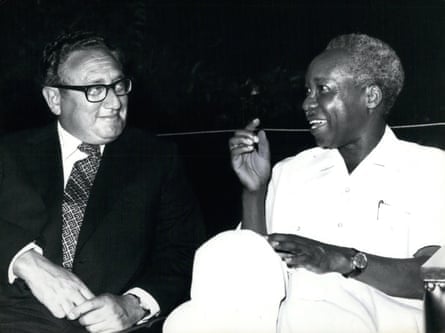Jidu La Mabambasi
JF-Expert Member
- Oct 20, 2014
- 15,330
- 24,212
Henry Kissinger, aliyekuwa Waziri wa Mambo ya Nje na Mshauri wa Usalama wa Kitaifa wa Marekani ambaye alikimbia Ujerumani ya Kinazi akiwa kijana na baadaye kuwa mmojawapo wa watu wenye ushawishi na utata mkubwa katika historia ya sera za kigeni za Marekani, amefariki dunia. Alikuwa na umri wa miaka 100.
Kissinger alifariki jana Jumatano nyumbani kwake Connecticut, hii ni kulingana na taarifa kutoka kwa shirika lake la ushauri, Kissinger Associates. Shirika hilo halikutoa sababu ya kifo chake.
Kissinger alikuwa alama ya sera za kigeni za Marekani katika miaka ya 1970. Alipokea Tuzo ya Amani ya Nobel kwa kusaidia kuratibu mwisho wa ushiriki wa kijeshi wa Marekani katika Vita vya Vietnam na anaheshimiwa kwa diplomasia ya siri iliyosaidia Rais Richard Nixon kufungua mlango wa mawasiliano kati ya Marekani na China ya Kikomunisti, ikioneshwa na ziara ya Nixon nchini humo mwaka 1972.
================
Henry Kissinger, a former US secretary of state and national security adviser who escaped Nazi Germany in his youth to become one of the most influential and controversial foreign policy figures in American history, has died. He was 100.
Kissinger died Wednesday at his home in Connecticut, according to a statement from his consulting firm, Kissinger Associates. The firm did not provide a cause of death.
Kissinger was synonymous with US foreign policy in the 1970s. He received a Nobel Peace Prize for helping arrange the end of US military involvement in the Vietnam War and is credited with secret diplomacy that helped President Richard Nixon open communist China to the United States and the West, highlighted by Nixon’s visit to the country in 1972.
But he was also reviled by many over the bombing of Cambodia during the Vietnam War that led to the rise of the genocidal Khmer Rouge regime and for his support of a coup against a democratic government in Chile.
In the Middle East, Kissinger performed what came to be known as “shuttle diplomacy” to separate Israeli and Arab forces after the fallout of the 1973 Yom Kippur War. His “détente” approach to US-Soviet relations, which helped relax tensions and led to several arms control agreements, largely guided US posture until the Reagan era.
But many members of Congress objected to the secretiveness of the Nixon-Kissinger approach to foreign policy, and human rights activists assailed what they saw as Kissinger’s neglect of human rights in other countries. No issue complicated Kissinger’s legacy more than the Vietnam War. When Nixon took office in 1969 – after promising a “secret plan” to end the war – roughly 30,000 Americans had been killed in Vietnam.
Despite efforts to shift more combat responsibilities to the South Vietnam government, American involvement persisted throughout Nixon’s administration – critics accused Nixon and Kissinger of needlessly expanding the war – and US engagement ultimately ended with the fall of Saigon in 1975 and more than 58,000 American lives lost.
In a highly controversial decision, Kissinger shared the 1973 Nobel Peace Prize with his North Vietnamese counterpart Le Duc Tho for that year’s Paris peace accords; citing the absence of actual peace in Vietnam, Tho declined to accept, and two members of the Nobel committee resigned in protest over the award.
Domestic outrage in the US over the war centered on the bombings of Laos and Cambodia, where the brutal Khmer Rouge movement used the American bombings as a recruiting tool before coming into power and carrying out one of the worst genocides of the 20th century.
“For me, the tragedy of Vietnam was the divisions that occurred in the United States that made it, in the end, impossible to achieve an outcome that was compatible with the sacrifices that had been made,” Kissinger told CNN’s Wolf Blitzer in 2005.
Though his era as a high-powered architect of US foreign policy waned with the decline of Nixon amid the Watergate scandal, Kissinger continued to be an independent mover and shaker whose musings on diplomacy always found an ear.
“In order to negotiate, one has to understand the perception of the other side of the world. And they have to understand our perception. And there has to be a decision on both sides that they’re going to try to reconcile these differences,” he told CNN’s Fareed Zakaria in 2008.
Kissinger also commanded attention well beyond the realm of international diplomacy. He topped Gallup’s “Most Admired Man” survey three years in a row in the 1970s and his personal life, public appearances and nights in New York’s famed Studio 54 club once drew regular headlines.
“The nice thing about being a celebrity is that if you bore people, they think it’s their fault,” he once quipped.
Kissinger is survived by his wife, Nancy, two children from his first marriage, Elizabeth and David, and five grandchildren.
Former President George W. Bush remembered Kissinger for “his wisdom, his charm, and his humor.”
“I have long admired the man who fled the Nazis as a young boy from a Jewish family, then fought them in the United States Army. When he later became Secretary of State, his appointment as a former refugee said as much about his greatness as it did America’s greatness,” he said in a statement. “He worked in the Administrations of two Presidents and counseled many more. I am grateful for that service and advice, but I am most grateful for his friendship.”
CNN
